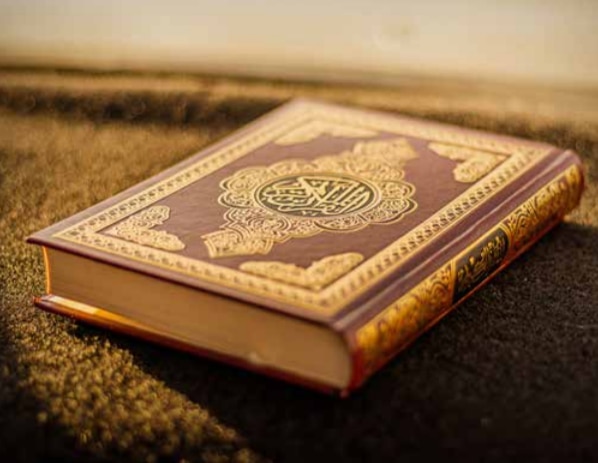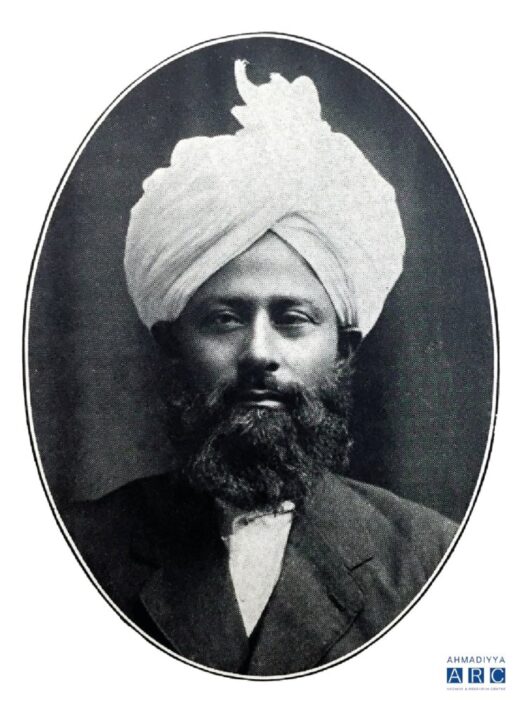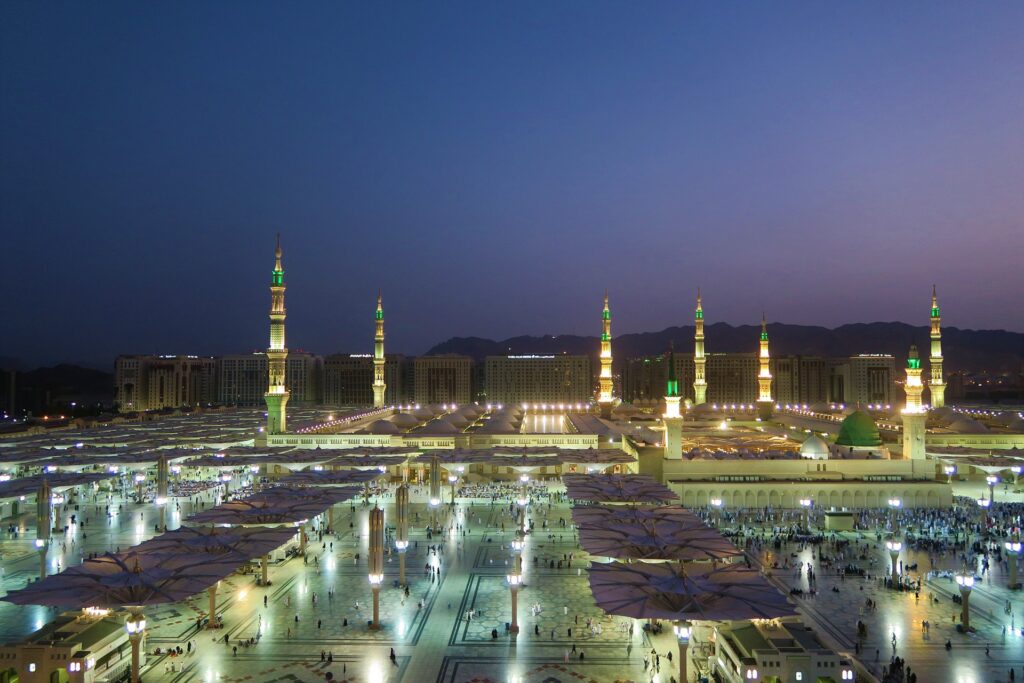Ataul Fatir Tahir, Al Hakam

“Khilafat is a divine reward and there is none who can stop it. It is a vehicle for the spread of Allah’s light and whoever desires to end it, in fact, wants to extinguish the light of Allah.” (Hazrat Khalifatul Masih IIra, Tafsir-e-Kabir, Vol. 6, p. 330)
The Holy Quran is Allah’s word, perfectly authored and profound in meaning. Every letter, word, sentence and theme has a purpose – they are not arbitrary, as the random fall of rain droplets. Topics or verses may seem unsystematic to the untrained eye, yet they are not.
An example is the connection in the Holy Quran between the slander – commonly known as Ifk – against Hazrat Aishara and the verse promising Khilafat to Muslims, both of which arrive closely together in Surah al-Nur (chapter 24). Seemingly exclusive verses uncover a deceptive attack by the hypocrites amongst Muslims on the future establishment of Khilafat in Islam.
Early themes in Surah al-Nur
The promise of Khilafat in the Quran arrives in verse 56 of Surah al-Nur (The Light). Allah starts the surah (chapter) by declaring, “[This is] a surah which We have revealed and which We have made obligatory; and We have revealed therein clear Signs, that you may take heed.”
In the opening verses, the surah lays out Islamic punishments for illicit sexual relationships and for those who wrongly accuse “chaste women” of illicit relationships “but bring not four witnesses”.
The Event of Ifk (false imputation) – in which the hypocrites, with some success, spread vile rumours accusing Hazrat Aishara, the noble wife of the Holy Prophetsa, of having an illicit relationship with Hazrat Safwanra bin Mu‘attal – is then addressed by Allah from verses 12-20.
The slander against Hazrat Aishara was serious and had some companions in doubt and affected the Holy Prophetsa too.
Describing the intensity of this slander and its effects, The Seal of the Prophets (Vol. II) reads:
“Abdullah bin Ubayy and his wretched followers propagated this lie so widely, and disseminated such a twisted version of it that the Muslims began to lose their peace of mind. Certain Muslims, who were of weaker dispositions and unmindful, became victims of this propaganda as well. Hence, this era was especially a time of full force for the hypocrites, and their most desirable weapon was to spread false and filthy propaganda in order to slander the Holy Prophetsa and his relatives. These rumours were spread so cunningly that on certain occasions, due to not having in depth knowledge of affairs, the Holy Prophetsa and his most prominent Companions could not even find the opportunity to rebut these allegations, and their poison would continue to spread. In these instances, latter Muslims who were not in the habit of thorough investigation and deep thought, would consider this misinformation to be true and begin relating these accounts. It is in this manner that these narrations have found way into the collections of such Muslims who are the Waqidi type, etc. […]”. (Seal of the Prophets, Vol. II, Hazrat Mirza Bashir Ahmadra MA, p. 419)
Allah strongly condemned the slander against Hazrat Aishara and questioned why Muslims even entertained them:
لَوۡ لَاْ اِذۡ سَمِعۡتُمُوۡہُ ظَنَّ الۡمُؤۡمِنُوۡنَ وَ الۡمُؤۡمِنٰتُ بِاَنۡفُسِہِمۡ خَیۡرًا ۙ وَّ قَالُوۡا ہٰذَاۤ اِفۡکٌ مُّبِیۡنٌ
“Why did not the believing men and believing women, when you heard of it, think well of their own people, and say, ‘This is a manifest lie?’” (Surah al-Nur, Ch.24: V.13)
Addressing the hypocrites who forged the accusation, Allah asks, “Why did they not bring four witnesses to [prove] it?” and that “Since they have not brought the [required] witnesses, they are indeed liars in the sight of Allah!” (Surah al-Nur, Ch.24: V.14)
The slander was so serious that Allah said:
“Were it not for the grace of Allah and His mercy upon you, in this world and the Hereafter, a great punishment would have befallen you for [the slander] into which you plunged.” (Surah al-Nur: V.15)
The Quran then admonished:
“[…] you uttered with your mouths that of which you had no knowledge, and you thought it to be a light matter, while in the sight of Allah it was [a] grievous [thing].” (Surah al-Nur: V.16)
Instead, Allah says, Muslims should have said:
“It is not proper for us to talk about it. Holy art Thou, [O God], this is a grievous calumny!” (Surah al-Nur: V.17)
Surah al-Nur firmly establishes that accusations must be supported with substantial proof, and in the case of illicit relationships: four witnesses. Otherwise, Allah strictly instructs Muslims not to entertain such rumours ever again:
یَعِظُکُمُ اللّٰہُ اَنۡ تَعُوۡدُوۡا لِمِثۡلِہِ اَبَدًا اِنۡ کُنۡتُمۡ مُّؤۡمِنِیۡنَ
“Allah admonishes you never to return to the like thereof, if you are believers.” (Surah al-Nur: V.18)
A sudden change
In his tafsir (commentary) of Surah al-Nur, Hazrat Mirza Bashirudin Mahmud Ahmad, Khalifatul Masih IIra notes that the theme of the surah seems to drastically change when verse 36 arrives:
“Allah is the Light of the heavens and the earth. The similitude of His light is as a [lustrous] niche, wherein is a lamp. The lamp is in a glass. The glass is as it were a glittering star […]”.
Then, in verse 56, Allah suddenly talks about Khilafat and its establishment:
وَعَدَ اللّٰہُ الَّذِیۡنَ اٰمَنُوۡا مِنۡکُمۡ وَ عَمِلُوا الصّٰلِحٰتِ لَیَسۡتَخۡلِفَنَّہُمۡ فِی الۡاَرۡضِ کَمَا اسۡتَخۡلَفَ الَّذِیۡنَ مِنۡ قَبۡلِہِمۡ ۪ وَ لَیُمَکِّنَنَّ لَہُمۡ دِیۡنَہُمُ الَّذِی ارۡتَضٰی لَہُمۡ وَ لَیُبَدِّلَنَّہُمۡ مِّنۡۢ بَعۡدِ خَوۡفِہِمۡ اَمۡنًا ؕ یَعۡبُدُوۡنَنِیۡ لَا یُشۡرِکُوۡنَ بِیۡ شَیۡئًا ؕ وَ مَنۡ کَفَرَ بَعۡدَ ذٰلِکَ فَاُولٰٓئِکَ ہُمُ الۡفٰسِقُوۡنَ
“Allah has promised to those among you who believe and do good works that He will surely, make them Successors in the earth, as He made Successors [from among] those who were before them; and that He will, surely establish for them their religion which He has chosen for them; and that He will, surely give them in exchange security [and peace] after their fear; They will worship Me, [and] they will not associate anything with Me. Then whoso is ungrateful after that, they will be the rebellious.” (Surah al-Nur: V.56)
Hazrat Khalifatul Masih IIra writes that where many commentators would accept the “randomness” of the Quran, followers of the Promised Messiahas refused to accept that the Quran had no purposeful order. (Tafsir-e-Kabir, Vol. 6, p. 322) Huzoorra goes on to uncover a profound link between the apparent changes in themes across Surah al-Nur – from the surah addressing illicit relationships, the lie against Hazrat Aishara, to the promise of Khilafat.
Why the slander against Hazrat Aishara?
Hazrat Khalifatul Masih IIra reveals the slander against Hazrat Aishara by the hypocrites who called themselves “Muslims” was carefully orchestrated as a deliberate attack on the future system of Khilafat by attacking Hazrat Abu Bakrra who they saw was going to play an instrumental role in the establishment of Khilafat. The opening verses of the surah, reference to the slander against Hazrat Aishara and the verse promising Khilafat uncover the ploy of the hypocrites who attempted to take two birds with one stone.
This accusation was not an attack due to personal resentment against Hazrat Aishara – she had no authority politically, financially, or a say on conflict and wars (Tafsir-e-Kabir, Vol. 6, p. 324). Deeper evil intentions were involved.
Hazrat Khalifatul Masih IIra concludes that the slander on Hazrat Aishara had two possible reasons. Either the accusation was true, but no Muslim can accept this and Allah nullified such a thought; or the accusation was by people who wanted to attack certain others through Hazrat Aishara and therefore achieve their motives.
“Now, we must ask who those people were that the hypocrites wanted to defame through which the leaders of the hypocrites would benefit. Also, who were the people that the hypocrites could take their frustration out on through this [slander against Hazrat Aishara]?
“With little thought, it can be established that by accusing Hazrat Aishara, enmity against two people can be revealed. First, the Holy Prophet, peace and blessings of Allah be on him, and second, Hazrat Abu Bakrra. This is because she was the wife of the former and the daughter of the latter. Both these men were such that their defamation could bring political benefits and advantages to their enemies. […]
“The slanderers could not take away the status the Holy Prophetsa possessed. What they feared was that their objectives after [the demise] of the Holy Prophetsa may still not be achieved […] sensing this danger, they accused Hazrat Aishara with the aim of reducing her respect and status in the eyes of the Holy Prophetsa and through this, the eminence and status that Hazrat Abu Bakrra [her father] possessed amongst the Muslims would be ruined […]”
“This is the reason why Allah the Almighty speaks of Khilafat after the incident of accusations against Hazrat Aishara.” (Ibid, p. 325)
Hazrat Khalifatul Masih IIra notes that during his time in Mecca, the Holy Prophetsa had no political or worldly power and influence. However, in Medina, after the Prophet’ssa arrival, a Muslim state was established. The hypocrites feared that through Khilafat of the Holy Prophetsa, the Islamic government would continue and the desires of the hypocrites to attain power reduced to naught.
Chief of the hypocrites, Abdullah bin Ubayy bin Salool’s desire for power
The central hypocrite behind the slander against Hazrat Aishara was Abdullah bin Ubayy bin Salool. The reason he was so bitter takes us back to when the Holy Prophetsa was still in Mecca and Islam had not spread to Medina.
Hazrat Khalifatul Masih IIra explains that before the Holy Prophet’ssa arrival in Medina, Abdullah bin Ubayy bin Salool was chosen to rule Medina – the Aus and Khazraj tribes had experienced tribal wars between each other for a long time and finally decided to settle the disputes and unify and elect one king; Abdullah bin Ubayy bin Salool was chosen.
During the same timeframe, some of the Aus and Khazraj tribe members met the Holy Prophetsa and accepted Islam. More members of the tribes in Medina went to meet the Prophetsa in Mecca and accepted Islam and the religion began to spread rapidly amongst the tribes.
As the Holy Prophetsa and his Companions were facing severe persecution in Mecca, the new converts of Medina – known as the Ansar – invited the Prophetsa to migrate and relocate to Medina, which the Prophetsa accepted. After his migration to Medina, the Prophetsa was unanimously chosen as the leader of the state of Medina and became the political king for the populace and the spiritual king for Muslims.
The leadership Abdullah bin Ubayy bin Salool was previously chosen for ended, creating great resentment in his heart. The Aus and Khazraj had a new king who was the leader of both spiritual and worldly realms for them, and Abdullah bin Ubayy bin Salool’s past authority was forgotten. This angered him and he joined the Muslims as a hypocrite, causing mischief throughout his life.
He still had his eyes on leadership and was worried over the spread of Islam in the future. He could not take away the kingship of the Holy Prophetsa and therefore took aim at the institution of Khilafat by slander.
Abdullah bin Ubayy bin Salool manufactured the vile accusation against Hazrat Aishara, daughter of Hazrat Abu Bakrra. If Hazrat Abu Bakr’sra daughter was maligned successfully, Abdullah bin Ubayy bin Salool and the other hypocrites saw it as harming any future leadership in Islam – Khilafat being their core target.
It wasn’t just Abdullah bin Ubayy bin Salool who had his eyes on leadership; Musaylima al-Kadhab possessed similar ideals and told the Prophetsa that he would accept Islam, along with his “large” following, if he was given leadership – an offer the Holy Prophetsa firmly rejected.
Hazrat Khalifatul Masih IIra notes that “It is for this reason that Allah the Almighty said in the Holy Quran:
اِنَّ الَّذِیۡنَ جَآءُوۡ بِالۡاِفۡکِ عُصۡبَۃٌ مِّنۡکُمۡ
“Meaning, ‘Those who slandered Hazrat Aishara are a group from amongst you who call themselves Muslims’.
“Allah then says:
لَا تَحۡسَبُوۡہُ شَرًّا لَّکُمۡ بَلۡ ہُوَ خَیۡرٌ لَّکُمۡ
“[Meaning], ‘Don’t think this slander will have harmful consequences; rather, the accusation will ultimately result in your progress and success.” (Tafsir-e-Kabir, Vol. 6, p. 326)
Failure of the hypocrites to attack Khilafat
In Surah al-Nur, Allah goes on to promise true Muslims the divinely supported institution of Khilafat and reminds them that no matter how much effort the hypocrites exert, they will fail in their plots and attacks to hinder the creation of Khilafat.
Ultimately, the leader of the munafiqeen (hypocrites), Abdullah bin Ubayy bin Salool was disgraced and died in the very life of the Holy Prophetsa, and the divine promise of Khilafat manifested. In the Holy Quran, Allah promised that the hypocrites would be punished when speaking about the slander against Hazrat Aishara and this ultimately came about.
The ploy attempting to demean Khilafat was exposed by Allah, and attempts of the hypocrites failed miserably.
“An illustrious niche”: Allah, Prophets and Khilafat

In his insight on the themes of Surah al-Nur, Hazrat Khalifatul Masih IIra gives the reason why, in verse 36, the subject suddenly changes, seemingly without any reason. After talking about the penalties for illicit relationships, accusations and the slandering of Hazrat Aishara, and before the promise of Khilafat (in verse 56), Allah says in Surah al-Nur:
اَللّٰہُ نُوۡرُ السَّمٰوٰتِ وَ الۡاَرۡضِ ؕ مَثَلُ نُوۡرِہٖ کَمِشۡکٰوۃٍ فِیۡہَا مِصۡبَاحٌ ؕ اَلۡمِصۡبَاحُ فِیۡ زُجَاجَۃٍ ؕ اَلزُّجَاجَۃُ کَاَنَّہَا کَوۡکَبٌ دُرِّیٌّ
“Allah is the Light of the heavens and the earth. The similitude of His light is as a [lustrous] niche, wherein is a lamp. The lamp is in a glass. The glass is as it were a glittering star. […]”
Huzoorra says “the Light” is Allah, the “lamp” is prophethood which protects the light of Allah and “the glass” is Khilafat that acts as a “reflector” of the divine light which prophets project.
In this verse, Allah teaches:
“The existence of Khilafat is essential like prophethood because through it [Khilafat], the age for the manifestation of divine majesty is extended and divine light is safeguarded for the benefit of the world for a long period of time.” (Ibid, p. 323)
If there was no Khilafat after the Prophetsa, then the spread of Allah’s spiritual light and the protection of that light through the Holy Prophetsa would have also ceased. Therefore, Khilafat had to be established.
A natural consequence of understanding the meaning of this verse is that Muslims desire Khilafat. Hence, Allah, in verse 56, promises true believers the reward of Khilafat that He would establish for them:
وَعَدَ اللّٰہُ الَّذِیۡنَ اٰمَنُوۡا مِنۡکُمۡ وَ عَمِلُوا الصّٰلِحٰتِ لَیَسۡتَخۡلِفَنَّہُمۡ فِی الۡاَرۡضِ کَمَا اسۡتَخۡلَفَ الَّذِیۡنَ مِنۡ قَبۡلِہِمۡ ۪ وَ لَیُمَکِّنَنَّ لَہُمۡ دِیۡنَہُمُ الَّذِی ارۡتَضٰی لَہُمۡ وَ لَیُبَدِّلَنَّہُمۡ مِّنۡۢ بَعۡدِ خَوۡفِہِمۡ اَمۡنًا ؕ یَعۡبُدُوۡنَنِیۡ لَا یُشۡرِکُوۡنَ بِیۡ شَیۡئًا ؕ وَ مَنۡ کَفَرَ بَعۡدَ ذٰلِکَ فَاُولٰٓئِکَ ہُمُ الۡفٰسِقُوۡنَ
“Allah has promised to those among you who believe and do good works that He will surely, make them Successors in the earth, as He made Successors [from among] those who were before them; and that He will, surely establish for them their religion which He has chosen for them; and that He will, surely give them in exchange security [and peace] after their fear; They will worship Me, [and] they will not associate anything with Me. Then whoso is ungrateful after that, they will be the rebellious.” (Surah al-Nur, Ch.24: V.56)
Hypocrites always fail
By refuting the slander against Hazrat Aishara and immediately following it with the verse promising Khilafat’s establishment, Allah reminds Muslims that the hypocrites will ultimately fail and the promise of Khilafat will continue. Their ploys were reduced to nothing and despite creating a big stir amongst the Muslims, the hypocrites ultimately failed.
Hazrat Khalifatul Masih IIra writes:
“The slanderer’s central aim was to disgrace them [the Khulafa] and to reduce their respect in society; however, God Almighty desires to raise their status instead.” (Tafsir-e-Kabir, Vol. 6, p. 329)
History does repeat itself and hypocrites crop up in divine communities; however, their attacks and desire to end Khilafat have never seen success and, insha-Allah, never shall.



An amazing read!
A timely guidance from the Holy Qur’an
An excellent selection of Hazrat Musleh Mau’ud’s (ra) quotes. Often, it is upon grossly misrepresented one-liners of Hazrat Musleh Mau’ud (ra) that hypocritical elements predicate their points to veil their insidious exploits.
Hence, it was pristinely appropriate to dish out the reality that lurks below the murky surface of hypocrites, who are masters in the craft of unabated deceit and duplicity in Huzoor’s own words.
This article rips away the malevolent mantle of those who stay within the community only to wreak havoc while claiming that “We are only promoters of peace.” Al Hakam is an indispensable blessing.
Hypocracy is indeed a curse. More so for the hypocrites than for anyone else as Allah the Almighty is all knowing.
This is the way to fight it.
JazakAllah for an awesome read!
A comprehensive well quoted up to the mark and excellent article ! Long live Khilafat ! Alhamdulillah!
Absolutely an amazing article.
Very well written and persuasive article.
Salaam.
As I understand it, four witnesses are required for consensual indecency such as zina [Sura Nur, as discussed above] and homosexuality [Sura Nisa, verses 16-19], and spreading the accusation of such activity without the stipulated four witnesses.
Rape is a wicked crime, and the verse which comes to mind in this regard is:
[4:149] “Allah likes not the uttering of unseemly speech in public, except on the part of one who is wronged. Verily, Allah is All-Hearing, All-Knowing.”
Were the voices of women alleging rape silenced in the time of the Noble Prophet s.a. or the Rightly Guided Khulafaa r.a. of Islam? If not, what right have we to do so now?